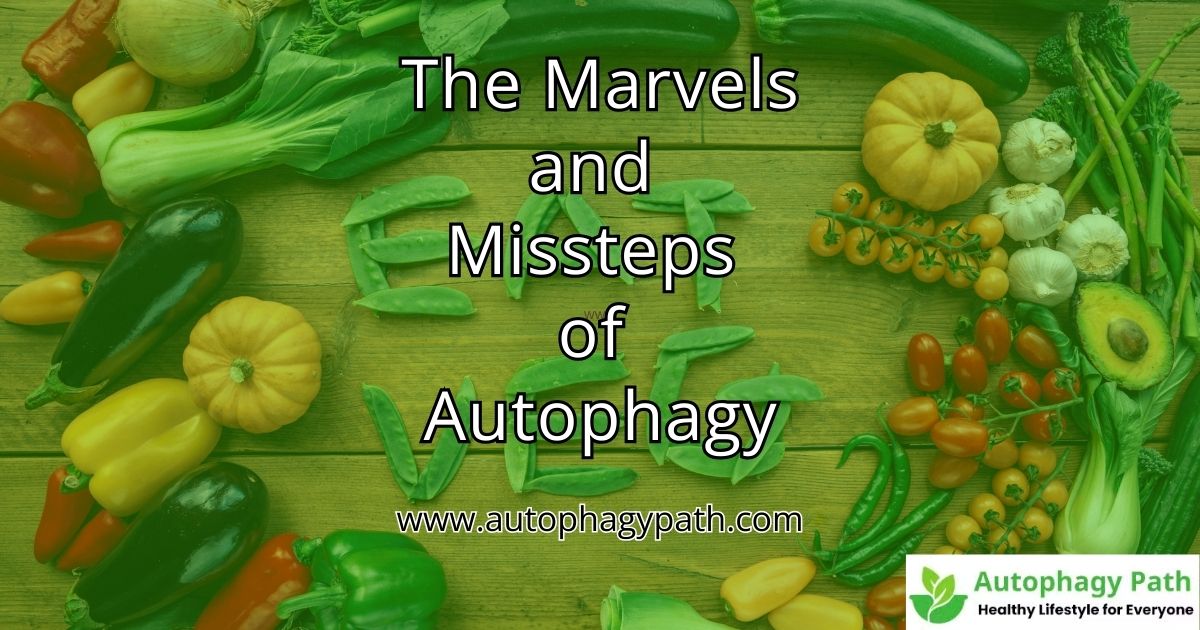Autophagy Benefits: Effects of An Autophagic
The Marvels and Missteps of Autophagic Practitioners
Welcome to the Autophagy Benefits, good and bad effects of an autophagic blog post. This is our discussion on autophagy, a fascinating cellular process that has gained significant attention.
Read more: Autophagy Benefits: Effects of An AutophagicWhat are the good and bad effects of an autophagic?
In this blog post, we will dig into the intricacies of autophagy in terms of beneficial effects and drawbacks.
Whether you are already familiar with autophagy or just starting to learn about it, this post of the good and bad Effects of an autophagic aims to provide an in-depth insight into this essential biological process for its potential health benefits.
Autophagy Benefits Details in this blog post
What is Autophagy?
Autophagy, derived from the Greek words “auto” (self) and “phagy” (eat), is a cellular process responsible for recycling and degrading damaged or unnecessary components within cells.
Think of it as a cellular clean-up crew that eliminates dysfunctional proteins, damaged organelles like mitochondria, and other cellular debris.
This process is crucial for maintaining cellular health and preventing the accumulation of harmful substances within cells.
Autophagy Benefits
- Cellular Renewal: Autophagy plays a vital role in cellular renewal by removing old and damaged cellular components, allowing for the creation of new, healthy ones.
- Immune System Support: Autophagy helps intracellular pathogens, contributing to a robust immune response.
- Longevity: Studies suggest that enhancing autophagy may promote longevity by reducing cellular damage and improving overall cellular health.
- Metabolic Health: Autophagy improves metabolic health, including better glucose regulation and lipid metabolism.
- Cancer Prevention: Proper autophagic activity may help prevent cancer by eliminating potentially cancerous cells and maintaining cellular homeostasis.
Adverse Effects of Autophagy:
- Cell Death: Excessive autophagy can lead to cell death, a process known as autophagic cell death, which may contribute to tissue damage and disease.
- Muscle Wasting: In some cases, autophagy can contribute to muscle wasting, especially in conditions like cachexia or prolonged fasting.
- Neurodegeneration: Dysregulated autophagy has been implicated in various neurodegenerative diseases such as Alzheimer’s and Parkinson’s, highlighting the delicate balance required for optimal neuronal health.
- Infection Susceptibility: While autophagy can help eliminate intracellular pathogens, a few pathogens have evolved mechanisms to subvert autophagic processes, leading to increased infection susceptibility.
Balancing Autophagy for Optimal Health:
Achieving a balance in autophagic activity is to reap its benefits while avoiding potential drawbacks. Here are some strategies to optimize autophagy for overall health:
- Intermittent Fasting: Controlled periods of fasting can stimulate autophagy and promote cellular rejuvenation.
- Exercise: Regular physical activity has been shown to enhance autophagy, especially in muscle cells.
- Nutrient-Rich Diet: Consumption of a diet rich in antioxidants, vitamins, and minerals supports overall cellular health and autophagic processes. The Ketogenic Diet is of such type.
- Stress Management: Chronic stress can impair autophagy, so practicing stress-reducing techniques like meditation or mindfulness can be beneficial.
- Consulting Healthcare Professionals: For individuals with specific health conditions or concerns, consulting healthcare professionals can provide personalized guidance on optimizing autophagy.

Autophagy Regulation:
Understanding how autophagy is regulated is crucial for optimizing its benefits. Several signalling pathways and factors influence autophagic activity:
- mTOR Pathway: The mammalian targets of the rapamycin (mTOR) pathway are prominent regulators of autophagy. When mTOR is active, it inhibits autophagy, whereas inhibition of mTOR, such as during fasting or calorie restriction, stimulates autophagy.
- AMPK Activation: AMP-activated protein kinase (AMPK) is another important regulator of autophagy. AMPK activation, often triggered by low energy levels (e.g., during fasting or exercise), promotes autophagy to restore cellular energy balance.
- Insulin and Glucose Levels: High insulin and glucose levels, as seen in conditions like diabetes or insulin resistance, can suppress autophagy. Maintaining healthy insulin sensitivity through diet and lifestyle can support proper autophagic activity.
- Protein Quality Control: Autophagy plays a crucial role in protein quality control by removing misfolded or aggregated proteins. Dysfunctional autophagy can lead to protein aggregation diseases like Alzheimer’s and Huntington’s disease.
- Hormonal Regulation: Hormones such as growth factors, cortisol, and thyroid hormones can influence autophagic processes. Balancing hormone levels through lifestyle and medication (when necessary) can impact autophagy regulation.

Autophagy and Age-Related Diseases:
Aging is associated with a decline in autophagic activity, contributing to the development of age-related diseases. Understanding this link is crucial for promoting healthy aging:
- Neurodegenerative Diseases: Dysfunctional autophagy is visible in neurodegenerative diseases such as Alzheimer’s, Parkinson’s, and ALS. Enhancing autophagy through lifestyle interventions or pharmacological agents holds promise for mitigating neurodegenerative processes.
- Cardiovascular Health: Autophagy plays a role in maintaining cardiovascular health by clearing damaged cellular components and regulating lipid metabolism. Strategies that support autophagy, such as exercise and a healthy diet, can benefit heart health.
- Metabolic Syndrome: Dysregulated autophagy is associated with metabolic syndrome, characterized by obesity, insulin resistance, and dyslipidemia. Lifestyle modifications that improve autophagic activity, such as weight management and physical activity, are central to managing metabolic syndrome.
Autophagy and Cellular Senescence
Cellular senescence, the state of irreversible cell cycle arrest, is closely linked to aging and age-related diseases. Autophagy has a crucial role in controlling the programmed cell death activity of cellular senescence, a word that has significance in medical terms.
- Senescent Cell Clearance: Autophagy helps clear senescent cells that accumulate with age and contribute to tissue dysfunction. Targeting senescent cell clearance through autophagy-enhancing interventions may have anti-aging effects.
- Senescence-Associated Secretory Phenotype (SASP): Senescent cells secrete pro-inflammatory molecules and factors known as SASP. Autophagy modulation can influence SASP composition and reduce age-related inflammation.
- Senolytics and Autophagy Modulators: Senolytic drugs and autophagy modulators have potential anti-aging therapies. These interventions enhance autophagic activity and eliminate senescent cells, promoting tissue rejuvenation.
Autophagy in Immunity and Inflammation
Autophagy plays a dual role in immune function, influencing both innate and adaptive immunity:
- Pathogen Clearance: Autophagy helps eliminate intracellular pathogens, including bacteria, viruses, and parasites. This process, known as xenophagy, is essential for host defense against infections.
- Inflammation Regulation: Dysfunctional autophagy can contribute to chronic inflammation, a hallmark of various diseases. Modulating autophagy may help regulate immune responses and reduce inflammation-associated pathologies.
- Autoimmunity: Autophagy dysfunction occurs in autoimmune diseases, where the immune system mistakenly targets healthy cells. Understanding the interplay between autophagy and autoimmunity is critical for developing targeted therapies.

Future Directions and Research Challenges
While significant progress is underway in understanding autophagy, several challenges and avenues for future research remain yet to draw attention :
- Selective Autophagy: Investigating the mechanisms and regulation of selective autophagy, which targets specific cellular components, organelles, or pathogens, is an active area of research.
- Autophagy in Cancer: The role of autophagy in cancer is complex, with both suppressive tumour and promoted tumour functions. Unraveling this complexity is essential for developing precise cancer therapies.
- Pharmacological Interventions: Developing safe and effective autophagy-modulating drugs remains a challenge. Balancing autophagy enhancement with potential side effects requires meticulous drug design and testing.
- Aging and Longevity: Understanding how autophagy contributes to aging and longevity at the molecular and cellular levels is a burgeoning field with implications for healthy aging strategies.
Frequently Asked Questions
What is autophagy? Is it good or bad?
Autophagy is a natural process generally considered beneficial for cellular health and function. Autophagy can be good and bad depending on the context and regulation.
Autophagy is a crucial cellular process that helps maintain cellular health by clearing damaged components and promoting cellular renewal.
It could affect overall health, including improved immune function, metabolic health, and potential longevity benefits.
However, excessive activity can also have negative consequences, such as cell death, muscle wasting, and potential implications in certain diseases like neurogenesis.
Therefore, the key is a balanced autophagic activity through lifestyle factors like intermittent fasting, exercise, and a nutrient-rich diet while also considering individual health conditions and consulting healthcare professionals when necessary.
What are the long-term effects of autophagy?
Autophagy has several long-term effects on the body, including cellular rejuvenation, improved immune function, and potential anti-aging benefits.
The long-term effects of autophagy can be both beneficial and potentially detrimental, depending on various factors such as the degree of autophagic activity, individual health status, and external influences.
Overall, the long-term effects of autophagy are factors such as lifestyle choices, genetic predispositions, and environmental factors.
Maintaining a balance in autophagic activity through healthy habits and seeking medical advice when necessary can help optimise the long-term benefits of autophagy while minimising potential drawbacks.
What are the benefits of reaching autophagy?
Autophagy has several benefits, including:
Removal of damaged cells and organelles
Enhanced cellular recycling and waste disposal
Regulation of cellular energy metabolism
Improved immune system function
Protection against neurodegenerative diseases
Potential anti-aging effects
Note: Autophagy is a complex biological process at the cellular level.
How long should you stay in autophagy?
It is recommended to stay in autophagy for at least 12-16 hours for significant benefits. Reaching autophagy, the cellular process of recycling and degrading damaged cellular components offers several health benefits:
Cellular Renewal: Autophagy promotes the removal of old and damaged cellular components, allowing for the regeneration of new, healthy cells, which contributes to overall tissue and organ health.
Immune System Support: Autophagy helps in clearing intracellular pathogens and damaged cells, bolstering the immune system’s ability to defend against infections and maintain overall immune function.
Metabolic Health: Proper autophagic activity is linked to improved metabolic health, including better regulation of glucose levels, lipid metabolism, and overall energy balance.
Longevity: Some studies suggest that enhancing autophagy may promote longevity by reducing cellular damage, enhancing cellular function, and potentially delaying age-related diseases.
Disease Prevention: Autophagy plays a role in preventing the accumulation of harmful substances within cells, reducing the risk of certain diseases such as cancer, neurodegenerative disorders, and metabolic conditions.
Overall, achieving autophagy through lifestyle factors like intermittent fasting, exercise, and a nutrient-rich diet can support cellular health and contribute to overall well-being.
Conclusion
Autophagy is a fundamental cellular process with a wide range of benefits for overall health.
While it plays a crucial role in cellular renewal, immune function, and metabolic health, it is essential to be mindful of potential adverse effects, such as cell death and muscle wasting, especially when autophagy gets dysregulated.
By understanding the factors that influence autophagic activity and adopting healthy lifestyle practices, we can harness the power of autophagy to promote optimal health and well-being.
It is a multifaceted cellular process with profound health, aging, and disease prevention.
Its regulation, impact on age-related diseases, role in cellular senescence, influence on immunity and inflammation, and future research directions highlight the complexity and significance of autophagy in biological systems.
Continued exploration of autophagy mechanisms and therapeutic interventions holds promise for enhancing human health and lifespan.







